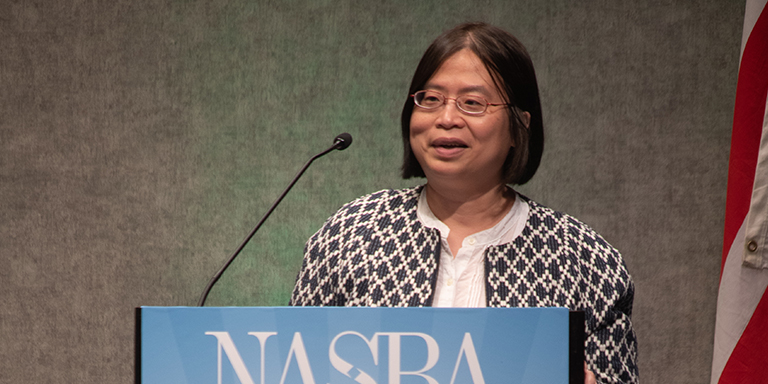Useful Research Reported
SHARE:
Updates from four ongoing educational research projects, all having been awarded NASBA grants, were presented at the 2019 Regional Meetings. Selected by the NASBA Education Committee and then approved by the NASBA Board of Directors, the results reported from these 2018 award recipients proved of interest to many of the Regional Meetings’ participants.
Understanding why less than 3 percent of the CPAs in the United States are Hispanic, although Hispanic Americans comprise over 17.4 percent of the U.S. population, is the focus of the research of Dr. Akinloye Akindayomi at the University of Texas – Rio Grande Valley. His preliminary findings were that 32 percent of the accounting students his study surveyed intend to take the Uniform CPA Examination within two years after their graduation. Half of them say they are motivated to become CPAs by money or job security. Less than 10 percent said they were motivated by their professors or job recruitment activities. Dr. Akindayomi recommended the profession encourage the development of Hispanic accounting professors, who might be more successful in motivating Hispanic students. NASBA is currently a supporter of The PhD Project, which works to support the efforts of minority group members to become academics.
Giving accounting a second chance is the theme of the research being conducted by Dr. Amy Tegeler and her team at the University of Wisconsin – Lubar School of Business, in Milwaukee. Her initial interviews, with 15 students who had come to accounting as a second career, found that many discovered accounting through their previous work experience. Dr. Tegeler observed: “These converts are looking for improvement over their present situation, but not looking to get rich. They recognize how their previous work experience will help them in accounting.” Reasons they gave for pursuing accounting included: helping people, serving society and doing fulfilling work. As these “converts” were older than the traditional accounting majors, the research found them to be less interested in travel and more interested in maintaining work/life balance than traditional students. Dr. Tegeler is developing a broader survey to confirm these initial interview findings.
Reading comprehension of accounting materials may be a stronger indicator of future success in accounting courses than math SAT scores, Dr. Helen Choy and her colleagues at Drexel University are discovering. The researchers differentiated reading to learn between “global” reading, which identifies the main idea of the document and summarizes, and “local” reading which involves understanding details and paraphrasing. For accounting reading, the local skills seem more important than the global skills, the researchers have found, but they believe more analysis is required before a definite conclusion can be drawn. Dr. Choy was asked how this research could be applied to current students, and she responded: “Encourage students to read the textbook.”
How students meet the 150-hour requirement is being explored by Dr. Linda Matuszewski and her team at Northern Illinois University’s College of Business. Their study of 141 auditors with 1-3 years of experience found: 53 percent had a baccalaureate with additional credits for the 150, and 46 percent had completed a graduate degree. In their sample, those with a graduate degree had obtained a higher pass rate on all sections of the Uniform CPA Examination. The NIU team found a high percentage of those who completed their first two years of education in a community college and then went to Northern Illinois University for their baccalaureate, went back to the community college to complete the 150.
All of the researchers are continuing with their work and anticipate presenting their final conclusions in academic journals.







